- Home
- Brian Hodge
Picking the Bones Page 2
Picking the Bones Read online
Page 2
She would give her heart more easily to refugees, I think, and maybe they sensed that, even if they couldn't speak a single word of the same language. In country after ravaged country they would look at Midori with such openness and yearning it was as if the most wounded regions of their souls were naked to her, and her gift in return was to show their plight to the rest of the world. She could look at eyes and reveal entire histories.
"What were you thinking then?" she asked, camera lowered. "You were so far away."
"I forget."
"And now you're here with me again, but you're lying."
"When I was growing up, I had all these books about World War Two," I told her, because I had to give her something. "I didn't actually read them much, except for the captions under the pictures. Everybody always remembers the famous shots that stand on their own, like raising the flag on Iwo Jima. But I was always most drawn to those shots that felt like freeze-frames, one slice out of an ongoing story. I'd look at a picture of a guy jumping out of his foxhole, or ducking for cover, and I'd wonder, 'How much longer did this guy live? Did he ever make it home?'
"I've never forgotten this one picture of a pair of German soldiers. Not an action shot, they were only looking at the camera. It must've been near the end of the war, because one of them was just a kid. At the time I didn't know enough to realize they were drafting boys by then. His face looked so incredibly smooth and his helmet was too big for him. It looked like the cap of a mushroom on the stem. But the other guy…you took one look at him and just knew he'd been at it ever since 1939. He needed a shave and had this thousand-yard stare. I used to wonder what he'd seen to look that way. So…I guess what I was thinking a minute ago…is that I know. That's all."
It still had a hold on me, that war, in ways that no others have. Particularly the German side. I've never felt that I've fully understood it, or that it even can be, but I'm not talking about factors like resentment over the terms of the Treaty of Versailles. What mystifies me still is what could so totally consume a nation and its rulers as to gear them toward war with such ruthless efficiency. From top to bottom, an entire society mobilized for destruction, disposal, and conquest, and yes, there were those who were immune to it, but they were few. It's always frightened me that one country, so small when seen in context on a map or globe, could overrun its neighbors and fix its sights on the rest of the world, then continue to pour forth resources both human and material, erupting like a volcano, until it exhausts itself from within.
And I marvel at the way beaten men, who couldn't all have been evil, could turn over their rifles, turn around, and walk home to live out the rest of their lives in peace, as if they'd only come through an especially bad dream.
Never again, the victors say, pledging vigilance, and they mean it with every fiber of their being. But they all die off eventually, and good intentions don't make for much of an inheritance.
So it frightens me sometimes, that if something like Nazi Germany could happen once, it could happen again, somewhere.
I let a thing like that slip, though, and people usually just scoff.
What are you worried about? You live in the only superpower left.
I don't find that nearly as comforting as they intend it to be.
Midori and I were still on the roof past nightfall, when the darkness became one with the mountains and the streets, and little pockets of the gutted city below us began to glow with unquenched fires.
"If I were to die, while working, and you were there," she said to me, "would you take my picture?"
"I don't know." Could I really be that cold-blooded? Strangers were one thing, but Midori? Just contemplating it hurt my heart. "Would you want me to?"
"That's what I'm asking," she said, because once again I'd misunderstood her. "Would you please take my picture?"
*
Sometimes I dwell on battles and aftermaths I'll never see, never can see, because time and technology have superseded them.
I consider the proximity required to fight with swords and battle-axes, with maces and war-hammers, when you really would have to wait until you saw the whites of their eyes. And the red of their wounds. I think of the savagery and the damage, easier to grasp than that of two-ton bombs, yet more nightmarish too, because it all came down to muscles: limbs hacked to cordwood and kindling, faces and chests pounded to jelly, heads cleaved from their shoulders.
How colorful the ancient killing fields must've been, those sprawling banquets for ravens and wolves. Not just the blood, but the shining metal and the dyes used for the bright proud banners under which they fought and fell.
And the noise, the pageantry. The cacophony of thundering drums and bagpipes and huge blaring horns. War as theatrical production. They must've found it terribly exhilarating as they stampeded toward one another unleashing their fiercest cries.
At least until all they could do was crawl.
*
Over the coming days we networked, cultivating relationships among the locals to work as guides, drivers, translators. We made some vital inroads with the officers of the militia and planned excursions along with them as their campaign continued. Geoff and Lily filmed an interview with the commander who now had Baghrada under martial law, and who seemed cool enough on the surface, although experience told me he was sweating out the possibility of a counterattack by Codrescu's army.
We'd been there almost a week when I received an invitation to the police station, a forbidding gray building now used as a military headquarters and, as I learned, a holding area for prisoners regarded as more important than garden-variety soldiers. They had one now, a wounded colonel from Codrescu's army, left behind during the retreat and captured two days earlier trying to escape over the border where we ourselves had entered the country.
"We thought you might enjoy a chance to hear his side of things," said Danis, a lieutenant I'd warmed up to, whose English was good enough that he'd acted as go-between when language proved a barrier. "Of course he lies. They all do when they are caught."
They took me to his cell and Danis remained behind to translate. At our approach, the colonel scrambled upright onto the wooden cot bolted to the wall and a shadow scurried away. He'd been playing with a rat. Or perhaps preparing to kill it, for food.
He didn't look like much now, wearing ill-fitting civilian clothes instead of a uniform. His left arm hung in a sling, useless after his elbow had been shattered by a bullet. He sported bruises, some fresh, and would've been a stouter man before, but after two or three weeks of reduced rations his skin seemed slack. The only reason I was seeing him now was because the others were finished interrogating him, had spent two days wringing him out like a sponge until what remained was fit only for the monotony of captivity.
I fingered my camera, then thought no, the time wasn't right yet. I wanted him relaxed enough to let defiant arrogance creep back in. I wanted a portrait of a man convinced he was held by people whose blood was inferior to his own. Instead, he looked downright quizzical, as though he thought he should know me.
Danis had a duty guard open the cell door. We had little to fear from the colonel, but they still took the precaution of cuffing his good hand to the wrist of his wounded arm. We were given stools to sit close enough for normal conversation. I started up a small recorder with a built-in condenser mic and tried a few questions, which Danis relayed. The answers I got back were hardly worth the breath expended, a few words delivered without conviction.
Finally the colonel muttered something to Danis, who looked embarrassed at having to be so rude as to pass it along.
"He, ah…says you are boring him. He asks if you have nothing better to do than discuss politics and policies and maneuvers."
"Ask him what would hold his interest," I said.
Danis posed the question, and at this the colonel straightened his back against the stone wall. He smiled at me, briefly, then his gaze roamed the cell while his tongue, like the tongue of a frog, pushed out from his jo
wly face to wet his lips, and his gaze fixed on a small barred window near the ceiling. He had no view here. But he had air.
"Baghrada has always been a beautiful city, yes?" the colonel said, through Danis. "But it is even more beautiful now, I think. You wonder why I think this? I will save you from asking, if you wish."
He waited, patient and confident, knowing that I would nod yes.
"Can you tell me," the colonel went on, "that as a boy you did not once take a frog, or a lizard, and pin it living to a board and cut it open to see what it looked like inside? Can you deny this?"
All the answer he needed must have flashed across my face, my grown-up's judgment of what had been childhood curiosity. I could still remember the window I'd sliced into the bluegill's side; how a throbbing air bladder popped like a tiny balloon when I stuck it with a sharp probe, and speckled my face with pondwater.
"Was it not beautiful inside to see?" he asked, growing rhapsodic while Danis gave me his words in a deadened monotone. "Was it not made yet more beautiful by knowing it could never be made whole again?" He smiled up at the window through which he could see only sky, as though imagining all that lay crumbling beneath it. "Everything else is but a matter of scale."
Over the years I've noticed a quality to certain people, not all of whom were behind bars, but most probably should've been. There is something fundamentally wrong with them, down to the core, and the longer they live, the more it seems to manifest itself in a baseness of appearance that I can only call degenerative. Old serial killers look this way, especially while reminiscing.
As I watched sweat collect in the iron-gray bristles of his hair, then ooze down the folds and creases of his face, I knew that the colonel was one of them. He may have been a military man, but he was first and foremost something else. He blinked little pig eyes and stroked the chapped red skin of his bad hand.
"Imagine a young woman, or a girl even," he said through Danis. "A fresh pretty thing, she has spent her whole life in one village and knows nothing of the world. Her priest may have told her it is a place of miracles and she believes him, because every day she wakes up to mountains. Then imagine the look on her face the first time she is forced to confront all the things that can happen to her and to her body, from soldiers who can do anything they wish, for as long as they wish. She was beautiful before…but now she is made…perfect…"
The further the colonel went on, the more difficulty Danis had remaining detached while translating. His breath whistled in his nose. He had three sisters; I knew that much about him. Finally Danis surged to his feet and punched the colonel in the face with one fist, then the other, to knock him back against the wall. The man leaned against the stones and dribbled blood as he laughed.
Obviously the interview was over.
"As you can see," Danis said, trembling, "the colonel is a sick man."
But he still had more to tell, several moments' worth, and Danis looked at him as if comprehending only half of it, if that much.
"What did he just say?" I asked.
"It makes not much sense to me," Danis said. "He says perhaps he has done a poor job explaining the work he does…but he says you of all people should understand—I'm trying for the correct word—should understand the…aesthetics. Then it becomes stranger still. He says he does not know if what we all seek to appease, whether or not we realize it, is an it, or a them…but that it is everywhere, watching everything, and that the rats are its eyes."
Danis paused to spit on the floor near the bunk.
"But as I told you already, he is a crazy man, I think. You should see the book we found in his belongings."
The colonel interrupted again, speaking to Danis but staring directly at me. The unfamiliar words seemed to hang in the air as Danis looked from one of us to the other.
"He asks," Danis said, hesitant now, "if that scar on the back of your neck is still as prominent as it used to be."
I ran the past minutes through my head, concluding that I hadn't turned my back on this man even once. I knew better, a habit ingrained from conversations with fitter, more dangerous men. Even if I had, could he have seen through collars and hair? And so, all I could think of in that moment, again, were the times I'd turned my lens upon slaughter while sensing a presence peering over my shoulder…so close sometimes I could feel on the back of my neck its cold sigh of satisfaction.
"I don't see any reason to continue with this," I said.
Danis flexed a sore hand and called for the duty guard to unlock the cage.
Maybe because none of us were expecting much from a man in the colonel's condition, this was what allowed him to get as far as he did. When the iron door opened, he was suddenly off the cot and across the cell, bulling into us, knocking Danis and me off-balance and into the guard. His wrists were still cuffed together, but he could run. He ran past us, over us, up a flight of stairs; ran as though he'd dreamed of this moment for days.
Astonishingly enough, he even made it out of the building and as far as the street. But by then other guards were following. They didn't chase him once he was in the open. Danis and I made it outside in time to see them aim their weapons at his back in an almost leisurely manner.
I've seen men die before, many times. In my experience it's either frightfully quick or agonizingly slow. They drop like stones or linger for eternities. I even filmed it once, my first time in Afghanistan—a Russian soldier crawling from a burning troop carrier in a convoy ambushed by Mujahideen rockets. I can't know what he really saw, but will never forget the sight of him floundering across the ground like a half-squashed roach, his blackened and bloodied face beseeching me through the lens. Ever since, whenever I've heard anyone speak of the glories of war, I've wanted to show them that footage.
The colonel, though…he died like no man I'd ever seen.
The bullets only seemed to propel him farther. He stumbled along with gouts of blood splashing the chewed-up street beneath him, yet still struggled on. He ran off-balance, as a man might with both hands bound before him, then another volley finished the job on his wounded elbow, clipping his arm in two. The severed half slipped from the sling and he dragged it behind him, still cuffed to his intact arm, for another ten or twelve incredible paces, until the best marksman dropped him to the street in a heap that seemed loath to ever stop tumbling.
For a few moments, not a one of us could do anything but stare.
Just three thoughts:
Not for a second could the colonel have believed he could escape.
So it seemed to me like a performance.
He died like a man in a movie.
*
On the Seventh Day of Creation, according to a very old story, God rested.
Presumably He thought this rest was every bit as fine as everything else He'd already called good, the just rewards after some very hard work, whose crowning achievement walked on two legs, sharpened spears, and harnessed the power of the atom.
Even today, people wonder when, where, and how it went wrong, a system so exquisitely balanced as this watery blue third planet from the sun, where even nature's harshest upheavals cannot undermine the inherent tranquility.
The answer seems obvious.
Like a watchman snoring through footsteps, the old Bastard was asleep on the job.
*
That night, in bed with Midori, I could hardly bring myself to touch her.
Even under the most normal circumstances I was never unaware of how small she was, although usually this just meant a subtle amazement that no matter how strenuously we made love, I wasn't going to break her.
But that night, even though we both were too exhausted and drained to do anything except lie there, I still could only think of her fragility, how exaggerated it now seemed. How breakable she really was.
By now we all knew about the rape camps, the barbed-wire enclaves deep in the mountains where Codrescu's campaign of ethnic cleansing extended to the next generation. Although they got carried away sometimes,
his stallions did.
I'd seen proof.
I'd forgotten, by the time the colonel had been gunned down, that Danis had mentioned a book he'd had on him when he'd been captured. Did I want to see it, Danis asked as they were scraping up the colonel's remains; did I want to know what kind of man he really was?
I did. I didn't. I did.
Danis first had to secure permission; then, in a room in the police station, where they catalogued evidence of crimes in both war and peace, he took the book from a cabinet and set it on a table before me. A hardback book, once slim, now bloated, as if things had been stuffed between its pages. I couldn't read the title, but realized what it was from the author's name. In China, nearly five hundred years before the birth of Jesus, a warrior named Sun Tzu had written a strategy manual so perfect that it was still used in the modern era, by everyone from generals to Wall Street raiders. At first, The Art of War seemed a reasonable thing to find on a military man.
"Just open it," Danis told me.
The text was gone, I saw, made irrelevant, the pages used for backing as in a photo album. Now they were stiff with tape and glue, paste and pictures. It didn't matter where I opened.
The first snapshot I saw showed a blurry uniformed soldier striding out of frame on the right, away from a woman kneeling before a stone wall and above a tiny heap on the ground. A wet telltale blotch stained the stone. I had heard, of course, of babies being swung by their ankles; had never, until this moment, seen evidence of it.
Flip at random to another page, more evidence—this time that the colonel, if indeed he was the photographer, had known firsthand about the systematized defilements he spoke of. He'd known firsthand of many things, even worse, about which he hadn't had the chance to gloat.

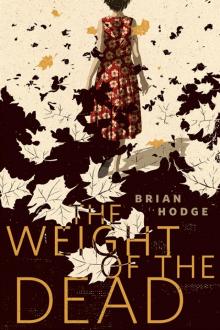 The Weight of the Dead
The Weight of the Dead Lies & Ugliness
Lies & Ugliness The Convulsion Factory
The Convulsion Factory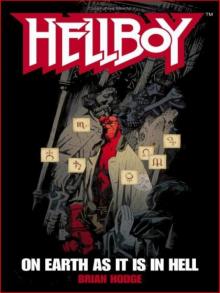 Hellboy: On Earth as It Is in Hell
Hellboy: On Earth as It Is in Hell Whom the Gods Would Destroy
Whom the Gods Would Destroy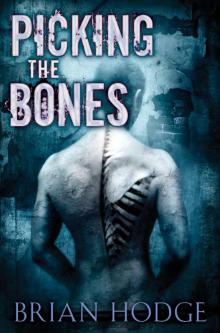 Picking the Bones
Picking the Bones Worlds of Hurt
Worlds of Hurt Oasis
Oasis Nightlife
Nightlife The Darker Saints
The Darker Saints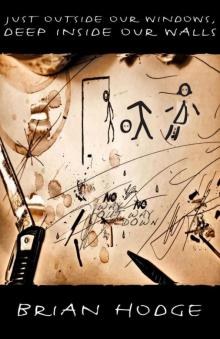 Just Outside Our Windows, Deep Inside Our Walls
Just Outside Our Windows, Deep Inside Our Walls A Haunting of Horrors, Volume 2: A Twenty-Book eBook Bundle of Horror and the Occult
A Haunting of Horrors, Volume 2: A Twenty-Book eBook Bundle of Horror and the Occult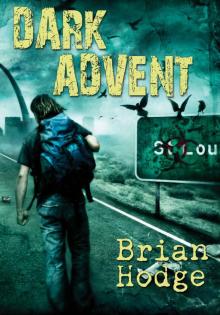 Dark Advent
Dark Advent Mad Dogs
Mad Dogs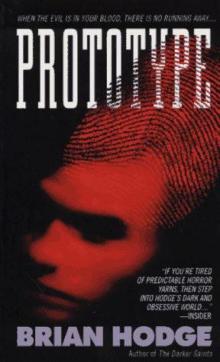 Prototype
Prototype Deathgrip
Deathgrip Falling Idols
Falling Idols